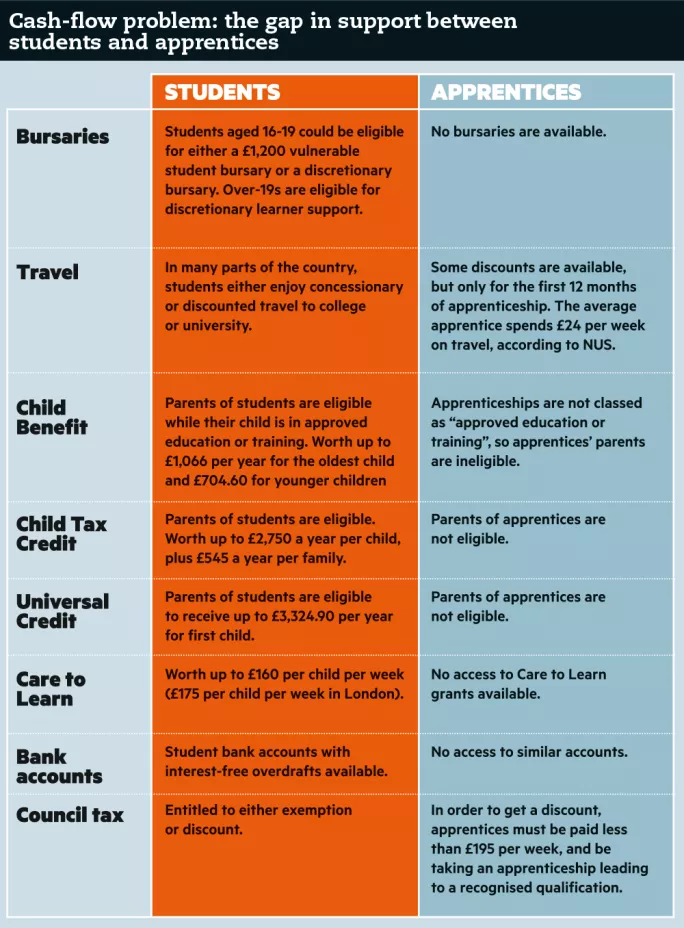Apprentices ‘treated like second-class citizens’

Apprentices are being treated like “second-class citizens”, with those from the most disadvantaged backgrounds being denied thousands of pounds of financial support available for college and university students, according to the NUS students’ union.
Research by the NUS and TES has revealed that while some apprentices earn as little as £3.40 an hour, they are also excluded from a number of means of support available to counterparts in FE institutions.
A college student with one child could be eligible for more than £10,000 a year in financial support, and their families could receive thousands more.
But apprentices - including those on the minimum wage, earning as little as £7,000 a year - are not entitled to any of this.
If apprenticeships are going to be the silver bullet to create a high-skilled economy for the future, the government has to go further than rhetoric
As well as not being eligible for Care to Learn childcare grants, some apprentices also miss out on travel discounts, council tax exemptions and student bank account packages.
The NUS warned that the risk of losing out financially could deter the most disadvantaged young people from becoming apprentices.
Shakira Martin, NUS vice-president for FE, said the idea that apprenticeships were a desirable way to “earn while you learn” was “far from the truth”. The 10p rise in the apprentice minimum wage to £3.50 per hour, being introduced in April, is welcome but “still not good enough”, she added.
“Apprentices are treated like second-class citizens, as workers and as learners. Financial support like Care to Learn [for apprentice parents], and Child Tax Credits for parents of apprentices, is not available,” Ms Martin said.
“If apprenticeships are going to be the silver bullet to create a high-skilled economy for the future, the government has to go further than rhetoric and genuinely support apprentices financially to succeed.”
Families suffer
Apprenticeships are not classed as “approved education or training” by the Department for Work and Pensions. This means that in the case of apprentices who live with their parents, the families could lose out on as much as £1,066 per year in Child Benefit; families receiving Universal Credit could lose more than £3,200. Unlike FE students, apprentices aren’t eligible for Care to Learn childcare grants.
The NUS also raised concerns about the rising number of students wrongly being charged council tax. It warned that, as a result of the ongoing apprenticeship reforms, an increasing number of apprenticeships do not lead a formal qualification, meaning more apprentices are having to pay council tax in full.
Mark Dawe, chief executive of the Association of Employment and Learning Providers, said the issue of financial support for apprentices needs addressing.
He added: “Providers report that Child Benefit is a particular barrier to recruitment because parents are reluctant to give it up.”

Megan Evans, who is taking a level 3 apprenticeship in digital marketing and graphic design at ACT Training in Cardiff, said many apprentices get “the worst of both worlds”. “In terms of wages we are just apprentices, but in terms of living costs we are expected to pay as much as everyone else,” she said.
“In order to build parity of esteem between academic and vocational education routes, the lack of support for apprentices living independently needs to be addressed.”
Euan Blair, CEO of training provider WhiteHat, said: “If we want apprenticeships to be seen as a top-tier option, then the benefits should be top tier, too. University students receive assistance from a range of sources, from accessing finance to discounted rates on council tax. Apprentices currently don’t receive many of these benefits and the system must be changed so that both are treated equally.”
A Department for Education spokesman said apprenticeships were “real jobs with training”, and that the median pay for apprentices at levels 2 and 3 was £6.70 per hour.
You need a Tes subscription to read this article
Subscribe now to read this article and get other subscriber-only content:
- Unlimited access to all Tes magazine content
- Exclusive subscriber-only stories
- Award-winning email newsletters
Already a subscriber? Log in
You need a subscription to read this article
Subscribe now to read this article and get other subscriber-only content, including:
- Unlimited access to all Tes magazine content
- Exclusive subscriber-only stories
- Award-winning email newsletters